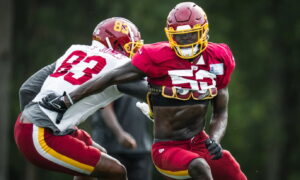Ten former NFL players, including five Hall of Famers, are asking the league and its production arm to pay up.
On Tuesday, a group that includes Washington Redskins Hall of Famer John Riggins filed a class-action suit in the U.S. District Court in New Jersey to reclaim payment for the use of their names, images, and likenesses from film footage they say was used on NFL Network and to promote the league without the ex-players consent.
John Riggins Suing NFL Films
The other four Hall of Famers suing are Dave Casper, Curley Culp, Tom Mack, and Ron Yary.
“NFL Films has never obtained authorization from retired players to use their images to be, as NFL Films puts it, the `backbone’ of the NFL Network,” according to the 81-page filing obtained by The Associated Press. “NFL Films’ conduct goes far beyond simply use of images without consent. It continues to this day to strike licensing business deals in New Jersey, affirmatively and falsely, misrepresenting that it has obtained all former players’ consent to appear in its promotional materials. The NFL does likewise.”
The complaint against the NFL and NFL Productions notes that in 1993, all players’ contracts began to include clauses that granted the NFL authority to use the names, images, and likenesses of players to publicize and promote the league. They claim it was never included with the players in the suit.
The filing also contends that the league and NFL Productions violated state laws regarding unfair competition and rights of publicity, as well as a federal statute claiming the league and its production arm was unjustly enriched by improperly using the ex-players.
The other former players listed on the suit are Mike Bass, Willie Buchanon, Roman Gabriel, Joe Kapp, and Phil Villapiano. It also asks that former players who have opted out of the Dryer v. NFL lawsuit, their heirs, and assigns be included in this case.
Though there is no stated sum in the complaint, it notes that according to published reports in 2002, NFL Films was making $50 million per year in licensing revenue, which applied only to third parties such as television networks.
“It did not include the far greater value to NFL Films, and the NFL itself, to use NFL Films footage to promote the NFL’s global brand, and to form the `backbone’ of the NFL Network,” the suit said.
The NCAA and video game company Electronic Arts are facing similar suits in California. This case cites a recent ruling in California that determined EA Sports could not use First Amendment protections to defend its actions.




















